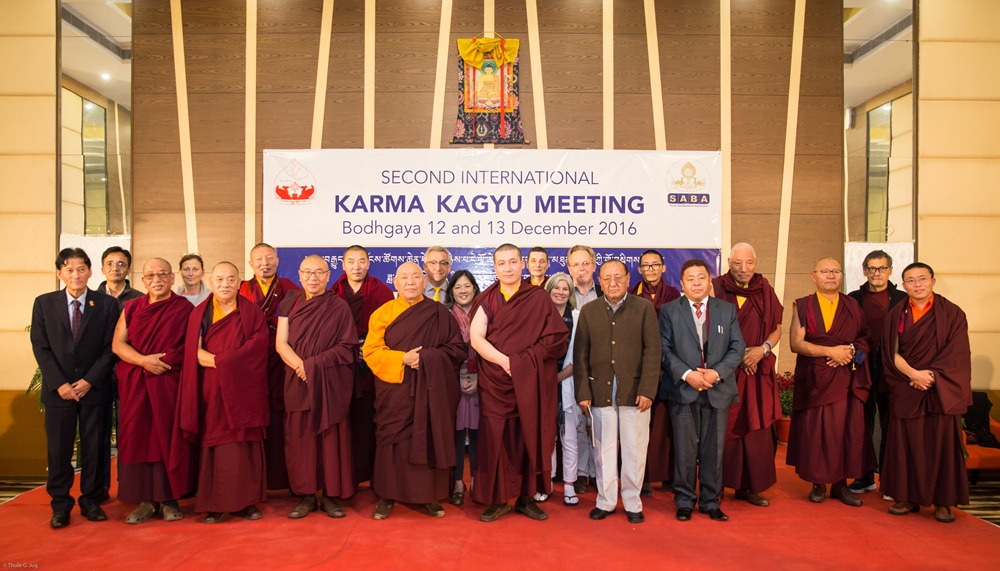Annual SABA Meeting in Kalimpong
May 22, 2025
Bodhgaya – Under the auspices of Thaye Dorje, His Holiness the 17th Gyalwa Karmapa, SABA hosted the Second International Karma Kagyu Meeting at Bodhgaya, on 12th and 13th December 2016, a few days ahead of the annual Kagyu Monlam prayers. This new tradition was established by Karmapa in 2015 during the Kagyu Monlam, when he instigated the first auspicious meeting.
The 2016 meeting’s theme was ‘Timeline’. The meeting covered: the journey of Buddhism over the centuries, in particular the Karma Kagyu lineage; the journey across countries and continents, from India to Tibet, back to India, and from there spreading all over the world.
160 representatives from various monasteries, dharma centres, lay communities and charitable organizations from around the world were invited to join a vibrant exchange of thoughts about the meaning of ‘lineage’ in one’s life, both on a personal and a spiritual level.

Group picture with Karmapa and the invited speakers
Dr. Tsewang Gyatso, from Sikkim, moderated the meeting throughout as the ‘Master of Ceremonies.’ Among the speakers were Professor Sempa Dorje, who started the meeting by giving an overview of the history of Buddhism in India. He began the ‘timeline’ with the historical Buddha Shakyamuni and followed it until the Buddha dharma’s arrival in Tibet.
Khenpo Chodrak Tenphel was the next speaker. He presented a summary of how the Karma Kamtsang lineage came into being; how it thrived over the centuries, up to the time of His Holiness the 16th Gyalwa Karmapa, Rangjung Rigpe Dorje.
The list of venerable speakers also included: Beru Khyentse Rinpoche; Shangpa Rinpoche; Sherab Gyaltsen Rinpoche; Nendo Rinpoche; as well as representatives from the Himalayan regions and various centres in Europe, South East Asia and the USA.
In his concluding speech at the end of the second day, Karmapa reminded the gathering that all forms of activity that we are engaged in are based on our acceptance of impermanence. The fundamental truth that ‘all compounded phenomena are impermanent’ is the first among ‘the four seals’, which make up the Buddhist view.
The Four Seals that the Buddha taught, the first one says, ‘All Compounded Phenomena Are Impermanent’. And I can see, I can feel that all our answers lie exactly there. We don’t even need to take a step towards searching for or finding this at all. Right here, where we stand, we can see impermanence. And one of the greatest examples is the passing into parinirvana of our teachers, our spiritual masters, our spiritual fathers. We don’t have to go back very far: just a little over two years ago we saw the greatest loss, the greatest parinirvana, and between that year and now we have witnessed the parinirvana of many great masters. And if we really look closely, it is extremely moving. But no matter how sad it is to encounter such a situation, there is always something we can extract from it, something extremely valuable, in fact invaluable, which is that it’s a physical way of showing that things are truly impermanent. It is not a good thing, it is not a bad thing, it just is. It just tells us where we stand, where we came from, and where we are going. It tells us everything: our past, present, and future, right there.
The reason why I’m saying this is that we all have a yearning, a sense of urgency. We do realise facts, such as that we need a sense of belonging, to have a sense of being together, being united – whatever terms we use. We all have a sense of that, and then towards that aim we all have gone through all kinds of hardship. But where did that lead us? Are we happy here now? It’s difficult to say. And if we continue like this, will we be happy? Will we be happy if we become more successful? Again, I’m not so sure.
What I’m trying to say is that before we begin any kind of idea, before we take any kind of step, we first need to know where we stand. If we don’t understand that, we can take thousands of steps, millions of steps, but to no end. But if we know where we are standing and from where we are taking the first step, then it’s worthwhile, however many steps we take. It could be just a few, but they are very, very meaningful.
So the first thing to do is to gain some sense – a direct sense, if possible – that all compounded phenomena are truly impermanent. To see that at this very moment where we are walking and talking we are truly impermanent.
The nature of things is like that, and if we are somehow able to get in touch with that nature, that everything is truly changing, that everything is truly impermanent, then on the basis of that we can build whatever we would like to build – organisations, trying to unite everything under one umbrella, have a system, or whatever. There is no restriction at all, there is no limit at all – as long as it’s going to benefit sentient beings we can do it. But before we take that step first we really have to understand where we are. Unless we understand that, it’s kind of futile.
As the International Karma Kagyu Meeting will be an annual event, the next meeting of this platform of exchange for international representatives will take place in December 2017.